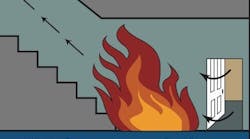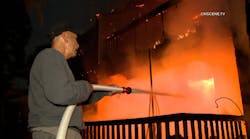Editor's Note: This point/counterpoint column is dedicated to fostering honest discussions about issues confronting the fire service today. It is not our intention to upset or anger anyone. Rather, our intention is to bring important and sometimes controversial topics to your attention and give you the opportunity to share your thoughts and offer your solution. We want to hear what you have to say. Feel free to agree or disagree. Make your voice heard as we work together on behalf of our fire service. Opinions/thoughts expressed in this column may not necessarily reflect the feelings of the Firehouse editorial team, and we share them here as discussion points only. Please login to propose solutions and offer feedback below.
Budget cuts. These words have become an integral part of the daily lives of most fire service leaders. As many municipalities, both big and small, are forced to deal with declining revenues and shrinking financial reserves, they are left with little choice but to cut into all aspects of municipal operations, including public safety. This seems to inevitably set off a chain of events that ultimately leads to the use of the ubiquitous yet equally aggravating phrase: "They are asking us to do more with less."
Why do we dislike this phrase so much? First of all, it’s not really true. We have sat in on many budgetary discussions with many elected officials in different cities and not once did anyone ever tell the fire department to cut its budget and accomplish more. It simply didn’t happen. We have never encountered, and we don’t know anyone who ever has encountered, a budget meeting where funds were reduced while raising performance expectations. We typically impose that upon ourselves. We want to do better every year. We want to do more. The city is usually simply saying, "You have less money." Second, and the much larger issue, is the fact that we ask to be treated this way. Not directly, mind you, but indirectly we ask for it. In the face of budget cuts, most fire departments do everything possible to maintain the same or similar levels of service. What they ought to be doing is reducing services every time the budget is reduced.
A Tale of Two Departments
We know of a city that, in the fall of 2008, announced a 20% across-the-board budget reduction. In the weeks that followed that meeting, the fire chief argued that cuts of that magnitude would mean that firefighters would be laid off, response times would suffer and ultimately someone would likely die due to the delayed response. The fire chief met with union officials who were deeply concerned about the thought of layoffs.
The depths of the cuts that this city faced were popular fodder for the local evening news so it was not difficult for the union president to find an audience in the local media. He lamented that the city was toying with the safety of its citizens and the careers of its employees, and that it was unfair of the city to ask the fire department to "do more with less." The union picketed city hall and other venues. Publicly, the fire department appeared obstructive and combative. Privately, they were scrambling to decide how they were going to maintain services. During the same time, nary was a word heard from the police department. No interviews, no media campaigns, no picketing. One had to wonder whether the police department was doing anything. At the next budget meeting, the fire chief explained that emergency negotiations with the union had yielded a short-term plan of agreed-to furlough days and other salary and benefit concessions that, coupled with other line-item budget cuts, would let the department absorb the reduced funding "without any change to service levels."
While these changes were not permanent, they were acceptable to the union to secure the jobs of the other firefighters until additional levies could be passed in November 2009. The city manager applauded this presentation and congratulated the fire chief for his accomplishments, and why shouldn’t he? The fire department had accepted the budget reductions and the citizens would not feel any impact. This was a win-win for him. At that same budget meeting, the police chief explained that the budget cuts were too severe to maintain the same levels of service as the city had previously enjoyed; therefore, the police would stop responding to reports of petty theft. If someone were to call about a bicycle being stolen, no police officer was going to respond. The caller would be directed to a voicemail system where they could report the details. Shoplifters detained by retail security would be viewed as a civil problem between the business and the individual, not a criminal problem. Evidence technicians would be made available only for felonies. The city manager asked questions, but ultimately accepted this plan.
Over the course of 2009, the lack of police response was the topic at many city council meetings. Repeatedly, citizens told stories of vandalism, theft, suspicious activities and other reported crimes that received no response from the police. Businesses complained that they did not have the resources to pursue shoplifters through civil court and that the actions of the city were creating a difficult business climate. Through it all, the city manager and the police chief held firm that these service levels were necessary in order to meet the budget demands. The budget crisis in the fire department was never mentioned.
Behind the scenes, city council members did not like the public excoriations they were receiving and feared the impact that public displeasure would have on re-election campaigns – something had to be done. The city researched police grant opportunities. The city council increased fines and even contracted with a provider of red-light cameras as a way to increase funding for the police department. In the meantime, city attorneys pushed the fire union to accept the contract concessions as permanent. They insisted that the city’s revenues were not going to increase and unless the contractual concessions were made permanent, the union would see layoffs in 2010.
The fire department passed two levies in the fall of 2009 due mostly to the intense activities of the union; however, the levies alone were not enough. The fire department budget was cut another 7% for 2010 and the union accepted some of the contractual concessions as permanent in order to avoid layoffs. Although there was increased dissension in the ranks and severely decreased morale, the public saw zero impact in service. From the public perspective, nothing had changed and the fire department was proud of this accomplishment.
The city officials learned that they can essentially transfer the budget problem to the fire department to be solved. When faced with devastating cuts, the fire department would do anything within its power to not cut services; including volunteering for wage reductions and lobbying for levies. This is a powerful lesson and the city was paying attention as evidenced by the 2010 reductions. The police department, on the other hand, received no additional budgetary cuts for 2010, and given the increased revenues from the traffic cameras, fines and grants, actually saw its budget rise over 2008 levels. The cut in police services were felt immediately by the public (both residents and businesses) and they were angry. The city officials learned that proposed police budget reductions quickly came home to roost in the form of angry voters. The city could not transfer the problem to the police department. Again, the city was paying attention.
Conclusion
The experience of the fire department here is not unique. It happens all over the country. Its reaction also is not unique. For most firefighters, the job is a calling as much as it is a profession. When that calling is threatened, it receives a highly emotional response. The thought of cutting services is usually seen as unacceptable. Why is this?
Instead of internalizing the problem with layoffs and wage concessions, why not externalize the problem through visible reductions in service? What if this fire department had done something visible? What if the fire department had dropped engine staffing and strictly adhered to the “two-in/two-out rule”? What do you think the public reaction would be if you waited until the arrival of the next engine company to start your operations? What if that resident had appeared before city council irate that the fire department had let his house burn?
What if the fire department had closed a station and transferred personnel? Station closures are immediately visible to the public – particularly those who live in the immediate vicinity. Recently, proposed station closures have been met with such extreme resistance that members of the Boston Fire Department went as far as to volunteer their time off against the direct order of the city to keep a firehouse manned and operating. What were they trying to teach the city there, that they are willing to work for free?
When will we wake up and actually start doing less with less? When will we learn?
Tell us below.





